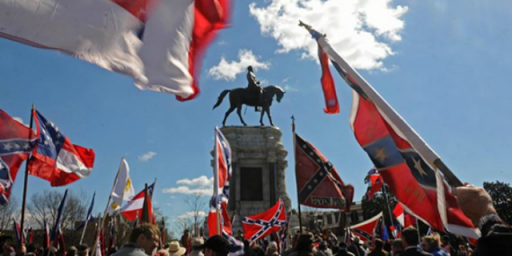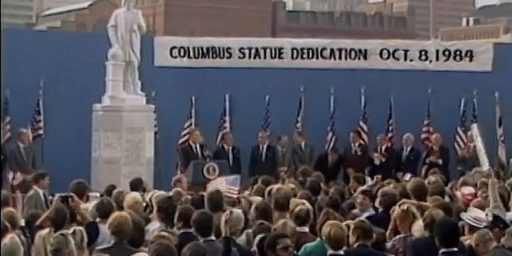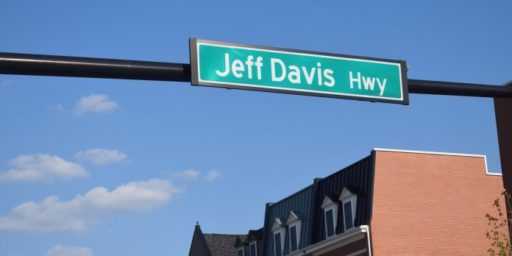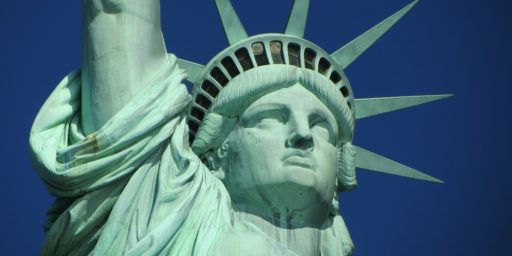Lee v. Washington: It’s not that Hard
There is so much to write on the events of the last several days, but here is a quick response to the following from Trump:
“So this week, it is Robert E. Lee. I noticed that Stonewall Jackson is coming down. I wonder, is it George Washington next week? And is it Thomas Jefferson the week after? You know, you really do have to ask yourself, where does it stop?”
First: Washington is celebrated in spite of his slave-holding while Lee is celebrated precisely because he fought to defend a slave-holding regime.
Second: yes, let’s have the conversation about slave-holding by the Founders. Let’s be honest about their flaws. Let’s assess and contrast the positions of Washington, Jefferson, and Madison to those of Franklin, Hamilton, and Adams on this subject. Let’s acknowledge that, yes, white supremacy has a long history in the US (from the very beginning), and that the debate over race is a long one, and let’s further understand that the debate continues.
Let’s also understand what we celebrate when we put statues on pedestals.
Let’s also address the fact that erecting a statue is not a manifestation of the study of history, rather it is always an inherently political act. The stance of the statue, the size, the location, what inscription is used, the timing of the construction, and so forth are all dripping in politics. A statue is never simply a statue.





They think they’re sooo cute and clever with this comparison. Tell me though, did London build any statues of Washington after the Revolution? Did we build any statues of King George or Cornwallis? After all, the nominal reason they are protesting the removal is “honor history” so why didn’t our ancestors choose to honor the losers they freed themselves from? What about the War of 1812 – where’s all the memorials to that? Are you telling me losers in war typically don’t get honored? Weird – it’s like those Southern statues means something else then…..
Statues honor. *What* they are honor is the point. Washington and the Founding Fathers, for all their sins, did something we as nation honor – they gave us the United States. Lee and the others deliberately broke that Union so even comparing the two is false from the start.
But hey, Both Sides Do It is the excuse du jour.
Yes, indeed. I hereby propose a statue of Robert E Lee- Standing behind his foreman and observing whether said foreman administers the lashes to a slave with proper vehemence, the slave tied to a post with blood freely flowing down his back.
That is a statue I can contribute to.
@Steven:
It is my recollection that Washington (as well as Jefferson) did not work to undo or further fracture the United States of America once we won our independence? I could be wrong, but … I’m not.
Seriously, I had a family member play Trump’s Washington and Jefferson analogies back to me a couple of evenings past.
Excellent short summary. Thank you.
You know, there’s a century between the Founding Fathers and the Civil War, and during those hundred years there developed what we might call a change in attitude – based in part on Jefferson’s ringing declaration that “all men are created equal” – and slavery began to seem a violation of America’s mission in the world.
And the slave states knew it and fought back with everything they had to stop the spread of anti-slavery feeling. By the late 1850’s intelligent men knew that the end was coming for slavery and that the question was how to extricate America from the mess. And then the Confederacy saved everyone a lot of intellectual work and brought on the war.
The problem of slavery was solved. The problem of bigotry continues.
Not the IT Dept….well stated
@Not the IT Dept.: You are correct of course. The Confederate cause could be thought of as a form of ‘originalism’ then, eh?
@OzarkHillbilly: What makes you think that the boys defending the statue in Charlottesville wouldn’t support your suggestion? I’m not seeing why they’d have a problem. It’s all part and parcel of the same attempt to correct the mistakes of the founders.
Glad you liked it, Q and J! Here’s an essay that is fascinating and explores a lot of the history behind the “history” of the Civil War. NYBR took it out from behind the usual paywall because it’s so important:
Dammit. Let’s try again: http://www.nybooks.com/articles/2001/04/12/southern-comfort/
@JohnMcC: I seem to remember that “originalism” was the argument used by Taney in the Dred Scott case as to why “Negroes can’t be considered equal to white people.” Supposedly “negroes” were already considered inferior by the Founding Fathers, hence Taney had to as well.
(Which means, aside from anything else, Taney was a lousy historian.)
@Not the IT Dept.:
Don’t forget that the US was backward in this regard.
Slavery became effectively illegal on English soil before 1800.
The British Atlantic slave trade was abolished in 1807.
Spain abolished slavery domestically and in its colonies in 1811, though Cuba refused to comply.
The Netherlands outlawed the slave trade in 1814.
France outlawed slavery in 1817, to take effect in 1826.
Slavery was outlawed in the British Commonwealth in 1833, but over a long ramp-down period and with compensation to plantation owners.
Americans were well aware of these developments.
@DrDaveT: Minor correction — the slave TRADE was outlawed by France in 1817 (effective 1826). Slavery in France wasn’t outlawed until 1848.
I’m trying to not be too harsh because obviously little thought went into this post, but when an African-American says we should tear down the Washington Monument or the Jefferson Memorial…what exactly is Taylor’s counter-argument going to be? Pat them on the head and tell them their perspective is just too narrow?
I’m seeing this witless blather from other sources. “Of course we can get rid of those symbols I don’t care but no one could possibly think we should get rid of the symbols I care about. Why? Because I care about them!” The United States of America was built, to a great extent, on slavery and the genocide of the American Indian. If you let people pull on this thread and expect to replace whatever unravels with a new weave, that may not be wise but it is rational. To think that you can let people pull on this thread and then stop them where YOU want to stop them is crazy.
Mike
@MBunge:
You do read these things before you comment, right?
@MBunge:
I think there emphasis on control in this sentence is really telling. It speaks to the underlying sense of a lot of people (many I suspect support Trump) that they have *lost* control over what people are and are not allowed to do.
So there’s a retreat to tradition in a desperate attempt to ignore the difficult conversations that Steven said are necessary.
It’s especially telling considering that the post explicitly directly is talking about potential requests from minority groups rather than political groups.
@Matthew Bernius:
Indeed.